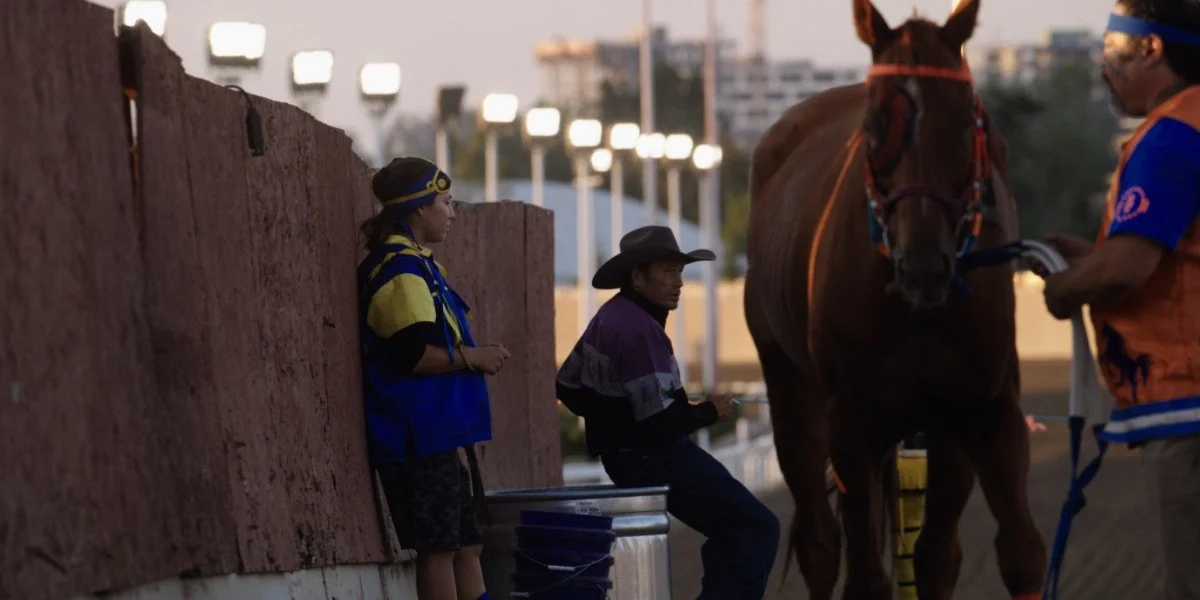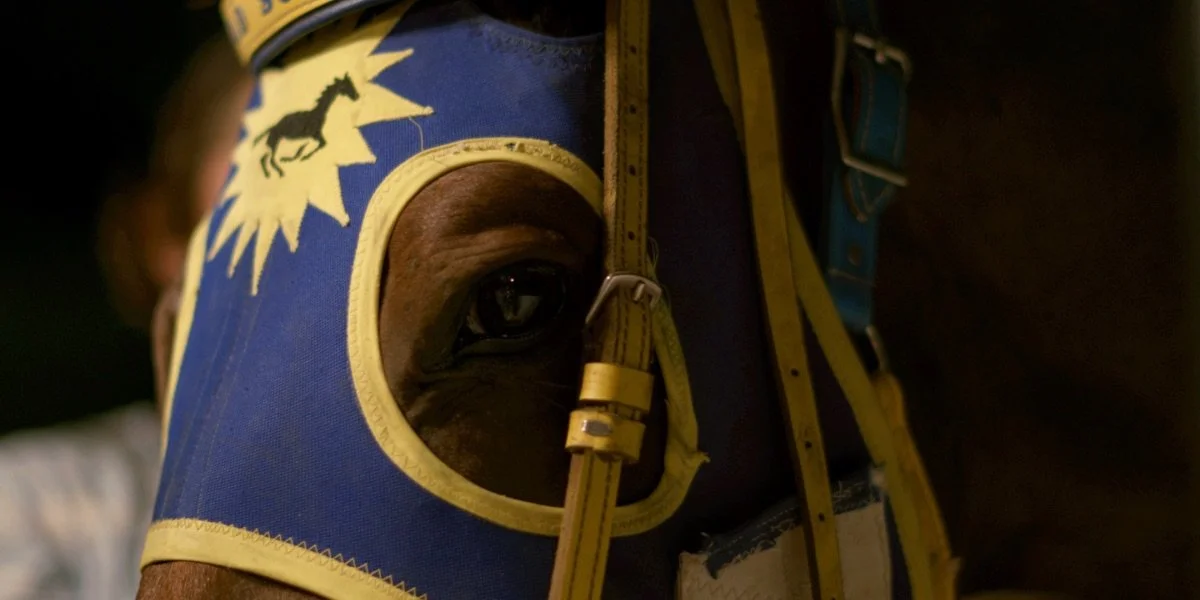‘Aitamaako’Tamisskapi Natosi: Before the Sun’ Review: Logan Red Crow Is Determined to Become the World’s Best Female Bareback Relay Racer
Courtesy of Pender PR.
Making its Canadian premiere this weekend at the Hot Docs Canadian International Documentary Festival is Aitamaako'tamisskapi Natosi: Before The Sun, the latest documentary from Indigenous filmmaker Banchi Hanuse. Fresh off its world premiere back in February at the Big Sky Documentary Film Festival, where it won the Big Sky Award, Aitamaako'tamisskapi Natosi: Before The Sun concentrates on a young First Nations woman whose ancestral bonds and extraordinary devotion to her horses have led her to the extreme sport of bareback relay racing.
Aitamaako'tamisskapi Natosi: Before The Sun is a captivating documentary that offers a glimpse into the life of a young Siksika ( a First Nation in southern Alberta) woman and her close relationship with her family and the horses they raise on their farm. The film follows Logan Red Crow as she trains for one of the most dangerous horse races in the world –– the bareback relay race –– in which riders incredibly switch horses between laps, jumping from horse to horse, without saddles, at a top-speed gallop. Against the beautiful backdrop of Blackfoot Territory, the documentary explores the deep connection between humans and animals, family and community, and tradition and modernity. Logan's determination and skill are truly inspiring, and her journey toward achieving her goals is a testament to the resilience and strength of the human spirit.
Courtesy of Pender PR.
Like other sports documentaries, Aitamaako'tamisskapi Natosi: Before The Sun platforms Red Crow's devotion to improving her ability and chasing her dreams of becoming the world's number-one female bareback relay racer. Early mornings, long hours of care, and quality time create a tremendously strong bond between Red Crow and her racehorses. Hanuse's intimate filmmaking goes to great lengths to highlight Red Crow's remarkable dedication that can only really be understood by those who have worked with animals. The documentary's narrative arc builds towards two significant races for Red Crow, including one at the world-famous Calgary Stampede. Since bareback relay racing is dominated by male competitors, Red Crow's feelings as "the odd one out" at the sport's highest levels becomes a prominent thematic element of the documentary, yet she never lets her gender get in the way of her ultimate goals. Determined, focused, and spiritually centered, Red Crow's station at the heart of Aitamaako'tamisskapi Natosi: Before The Sun contributes to the moving force of the documentary and its captivating nature.
Red Crow was born into a family of horsepeople, frequently referencing her late grandmother's attachment to the gentle giants as a guiding light for her aspirations in racing. Red Crow and her family still live on her grandfather's beautiful ranch, which her father now operates. Her father serves as her skilled mentor, passing down traditional practices in horsemanship in relation to their Siksika identities. While Red Crow's father supports her passion for horses, he would ultimately prefer for her to retire from the dangerous relay races to pursue an education that could provide his daughter with a stable future. This clash between Red Crow and her father offers a point of contention but does not detract from the incredible love shared by the family. En masse, the close attention that the documentary places on the ties between Red Crow's family and their horses is a beautiful snapshot of their Siksika roots and the connections they still have to their heritage. As Red Crow says, "Horses are a way of life for us."
Courtesy of Pender PR.
Hanuse and her creative collaborators on Aitamaako'tamisskapi Natosi: Before The Sun work amazingly to create a visually stunning and emotionally moving piece of filmmaking. The documentary opens with an incredible drone shot hovering over the endless fields at Red Crow's ranch, where their horses can roam freely in natural landscapes seemingly untouched by human development. Cinematographers Luke Connor and Ben Giesbrecht frequently employ drone footage, allowing their cameras to capture the vast expanses of the ranch and the race courses without obstructing the practices and movements of Red Crow and her family. In addition, the film's visual language takes full advantage of the ravishing qualities of the magic hours of early morning and late afternoon, frequently framing Red Crow and her horses against the intense sunlight of Alberta in the summertime.
Instead of utilizing stationary, studio-set interviews of the documentary's subjects, Hanuse consults them while they work, drive, and live their real lives, forming a naturalistic quality that serves the authenticity of Red Crow and her family's day-to-day existence. Aitamaako'tamisskapi Natosi: Before The Sun's sound design is another notable feature of the work, especially its intricate combination of ambient noise to embody the sounds horses make, particularly focusing on hoofbeats and breathing during the relay races. This natural tonality is layered in many scenes with Indigenous music, harkening back to the predominantly First Nations identity of the sport.
Structurally, Aitamaako'tamisskapi Natosi: Before The Sun follows a typical framework to other sports documentaries, building up anticipation as Red Crow works toward two major bareback relay races during filming. The dangerous essence of the sport adds thrilling suspense to the documentary's arc, contributing to the exciting viewing experience it creates for audiences. However, some viewers could find that the latter portion of Aitamaako'tamisskapi Natosi: Before The Sun falls victim to the cheesy trappings of other sports documentaries, leaning too much into the inspirational spirit of Red Crow's journey instead of relying on the intrinsically engrossing nature of her life and sport.
Courtesy of Pender PR.
Aitamaako'tamisskapi Natosi: Before The Sun is an outstanding representation of Red Crow's kinship with her horses, an essential connection to her Indigenous background. As a member of an underrepresented community practicing a relatively unheard-of sport, Hanuse's impressive efforts on the documentary (the director's first feature-length) serve as an important showcase for Red Crow's uplifting story of perseverance and commitment. Aitamaako'tamisskapi Natosi: Before The Sun will make its Canadian premiere in Toronto at the Hot Docs Festival on Saturday, April 29, with a second screening scheduled for Wednesday, May 3. Audiences in Canada will also be able to stream the documentary through the Hot Docs at Home streaming platform. For more information on Aitamaako'tamisskapi Natosi: Before The Sun, visit the documentary's website.



